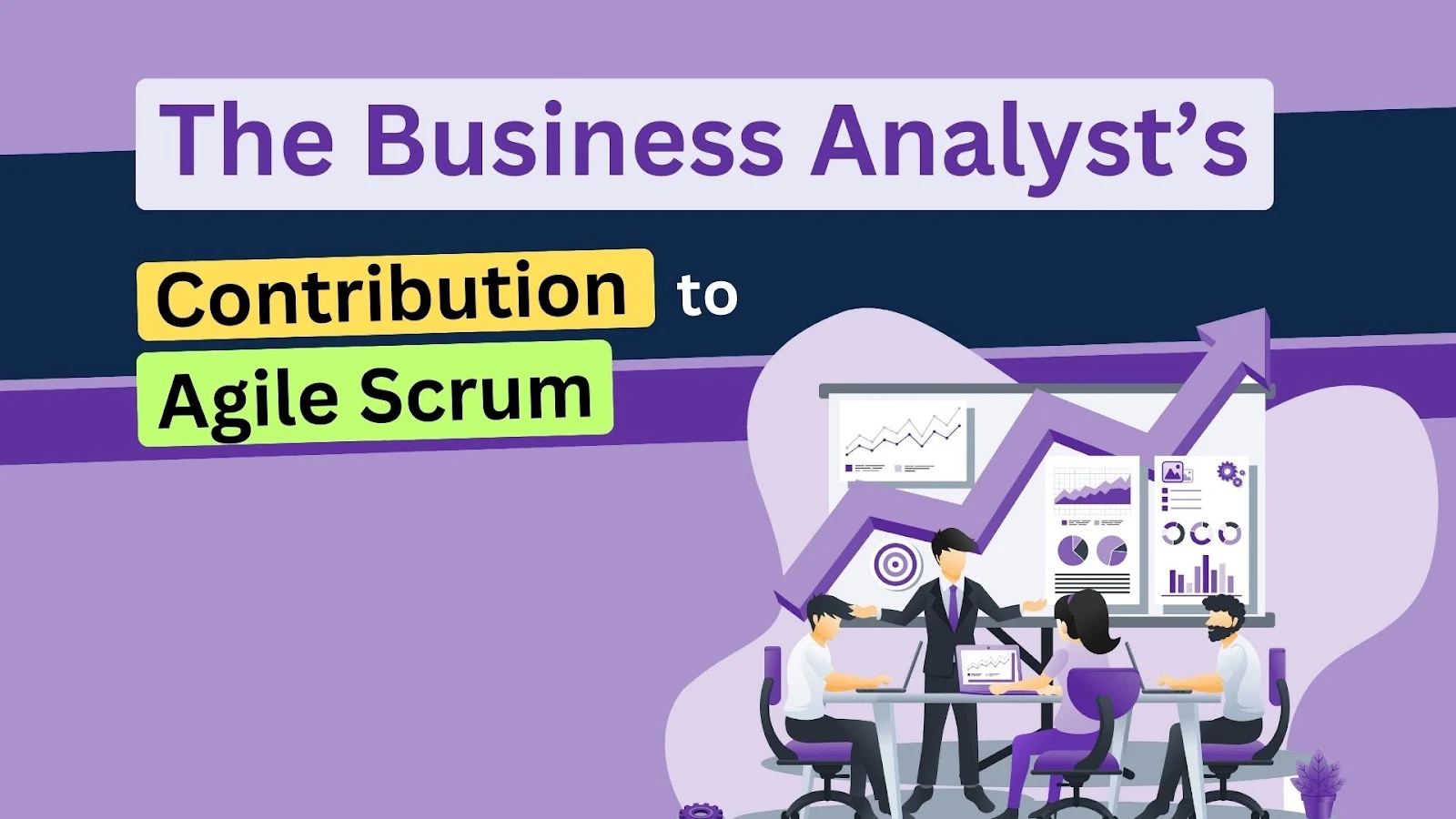The Business Analyst's Contribution to Agile Scrum
Let's examine the crucial role of a Business Analyst in Agile Scrum and how their unique set of skills and perspectives help Agile projects succeed.- Article authored by Kunal Chowdhury on .
Let's examine the crucial role of a Business Analyst in Agile Scrum and how their unique set of skills and perspectives help Agile projects succeed.- Article authored by Kunal Chowdhury on .
The Agile Scrum technique has become a leading force in project management evolution by encouraging flexibility, teamwork, and iterative advancement. The Agile Business Analysis Certification, which positions professionals as authorities in matching business needs with the project landscape, has grown in importance in this context.
In this blog, we examine the crucial role of a Business Analyst in Agile Scrum and how their unique set of skills and perspectives help Agile projects succeed.

Agile Scrum is an incremental, iterative methodology that promotes project development flexibility. It's a way of thinking that prioritizes incremental advancement, flexibility, and customer input over strict planning. The alignment of Scrum procedures and Agile concepts has become essential to contemporary project management. However, having a trained Business Analyst in Agile Scrum is vital for successfully navigating this terrain.
Obtaining an Agile business analysis certification is a wise step for experts who want to understand the nuances of Agile Scrum. To ensure that Business Analysts can effectively integrate their expertise into the collaborative Agile environment, this qualification serves as a compass, guiding them through the subtleties of Agile methodology. Business objectives and Agile development cycles are in line when trained experts apply their practical understanding of Agile principles.
Sprint Planning, which initiates an iteration, is a critical step in the Agile Scrum system. Here is where the Agile Scrum Business Analyst comes in, ensuring that the user stories are carefully honed and in line with the project goals. During these planning sessions, their ability to act as a mediator between technical teams and stakeholders is crucial since it helps everyone grasp the project's objectives and client expectations.
The fundamental units of Agile Scrum projects are user stories, which depict features from the end user's viewpoint. A competent Business Analyst with an Agile business analysis certification adds grace to the user story refinement and grooming process. They interact with stakeholders to obtain precise requirements, guaranteeing the development team knows the intended result. We can eliminate uncertainty and create more seamless development cycles by working together.
Agile Scrum relies heavily on effective communication, and the Business Analyst is the unifying factor amongst disparate stakeholders. With their unique capacity to convert technical jargon into layman's words and vice versa, Business Analysts establish an environment where the entire team can appreciate the project's nuances. Because of its clarity, there are fewer misconceptions, which promotes teamwork, which is essential to the success of Agile Scrum.
Agile concepts emphasize continuous improvement, and Business Analysts with certifications in Agile business analysis are skilled at implementing feedback loops. They foster productive dialogues to streamline procedures and improve project results through retrospectives or routine reviews. This dedication to ongoing development aligns with Agile Scrum principles, resulting in a cycle of improvement that advances the project.
Any project will inevitably experience change, and Agile Scrum is built to accommodate it. The Business Analyst with the Agile business analysis certification contributes strategic insight when handling change requests. They are extremely good at quickly analyzing how modifications will affect the objectives and schedule of a project. They assist in making well-informed decisions that keep the project on track and guarantee that the finished result aligns with changing business needs by working with the Scrum Team and stakeholders.
Data-driven decision-making is encouraged by Agile Scrum, and the Business Analyst plays a key role in supplying the essential insights. Their ability to analyze data and deep comprehension of corporate goals enable them to use data successfully. The Business Analyst transforms data, including market trends, performance indicators, and user feedback, into actionable insights that drive the project's success.
Obstacles are an inevitable part of Agile Scrum. Project bottlenecks are easily identified and analyzed by a Business Analyst with an Agile business analysis certification. Their keen problem-solving abilities are evident when they collaborate to develop strategic solutions with the Scrum Team, stakeholders, and end users. Through proactive problem-solving, the Business Analyst embodies the flexibility and durability that are hallmarks of Agile Scrum techniques and makes sure the Agile project runs successfully.
A trained Business Analyst in Agile Scrum is crucial in project management. They can succeed in Agile projects because they combine technical knowledge with business acumen, promote good communication, and foster continuous improvement. Business Analysts can influence project management in the future, one sprint at a time, as the Agile business analysis certification grows in recognition as a mark of competence.
Thank you for visiting our website!
We value your engagement and would love to hear your thoughts. Don't forget to leave a comment below to share your feedback, opinions, or questions.
We believe in fostering an interactive and inclusive community, and your comments play a crucial role in creating that environment.